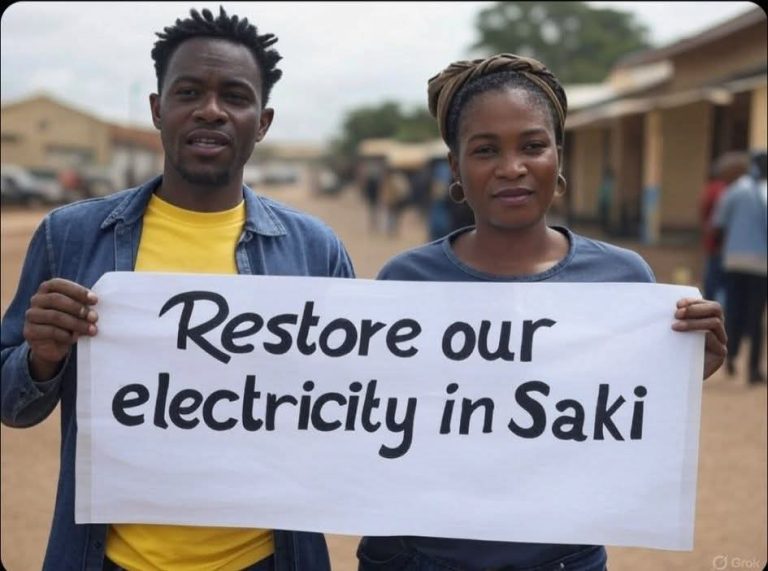The electricity crisis in the ancient town of Saki and its surrounding communities has taken a dire turn, sparking a wave of public outrage, economic distress, and a growing shift toward alternative energy. The Ibadan Electricity Distribution Company (IBEDC) is under increasing fire from residents who accuse the company of gross neglect, exploitation, and failure to fulfill its service obligations.
For months, residents have lamented the near-total blackout that has plagued the area. Many communities report receiving only two to four hours of electricity in an entire month since January 2025. Despite the near absence of supply, IBEDC has continued to bill consumers at full tariff rates, prompting widespread accusations of extortion and mismanagement.
Alhaji Azeez Suaib, popularly known as Sport Water, a respected leader representing 25 communities along Ogbooro Road, described the situation in stark terms. “As I speak to you, none of the communities along Ogbooro Road have enjoyed up to two hours of electricity in total since January 2025. It’s a complete blackout, yet we are consistently charged for services not rendered,” he said.
The chronic power failure has forced many residents to turn to solar energy, creating a quiet but widespread transition in the local energy landscape. However, the shift has not come without cost. Many households and small businesses are struggling to cope with the financial burden of installing and maintaining solar power systems.
In Gboro Community, Mr. Raheem Rasheed, widely known as Agenda, did not mince words in his criticism of IBEDC. “If a city as big and strategic as Saki cannot get stable electricity, what hope is there for smaller communities like Ekokan and others in Ward 04 of Saki West? This is a gross failure,” he stated, calling on the power company to engage in open communication with the community.
Entrepreneurs have been particularly hard-hit. Mr. Sefiu Adeagbo of Challenge area noted that while solar energy is gaining traction, many local businesses cannot afford the more expensive industrial inverters needed to sustain their operations. “Many small businesses are suffering. Productivity has dropped, and daily operations are being hindered. Not everyone can afford the luxury of solar energy,” he said.
Mr. Ilias Okikiola from the Sango Community made a heartfelt appeal to local authorities, including the Okere of Sakiland, the Saki Parapo Caretaker Committee, and the Chairman of Saki West Local Government. He urged them to intervene swiftly and decisively to address what he called a “sustained assault” on the economic well-being of the people.
The agitation has taken a more defiant tone in some quarters. Mr. Hammed Tunde called for a boycott of IBEDC payments, arguing that residents should no longer pay for electricity they do not consume. He alleged that extortion by IBEDC officials had become systemic and called for immediate enforcement of consumer protection measures in Saki West.
As frustrations boil over, various community groups and civil society organizations are mobilizing protests aimed at compelling IBEDC to take responsibility and provide lasting solutions. The movement, gaining momentum both offline and on social media, is being framed as a constitutional stand against exploitation and service failure.
With local businesses floundering, households under strain, and confidence in IBEDC at an all-time low, the people of Saki are demanding more than explanations — they want action. The call is loud and clear: restore electricity, end the exploitation, and give the people the service they deserve.
Korrect News

